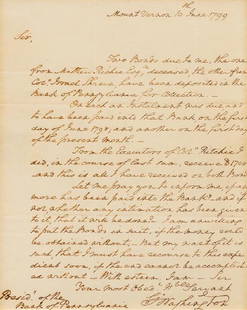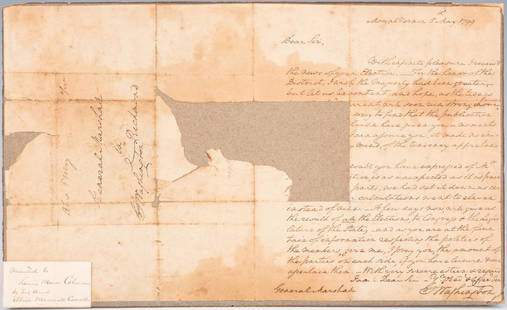
60149: George Washington letter signed ("Go: Washington
Similar Sale History
Recommended Items






Item Details
Description
George Washington letter signed ("Go: Washington"). Three pages of a bifolium, 8.25" x 13", "Head Quarters, Morristown" [New Jersey]; February 20, 1777. Docketed. A lengthy letter from General Washington to McDougall where he agrees with the decision to not part with General Clinton, who was needed to take Fort Montgomery. Letter, in the hand of Tench Tilghman (1744-1786), aide-de-camp to Washington during the Revolutionary War, to Brigadier General Alexander McDougall in Peekskill, New York, in which he responds to the latter's letter of February 16 and discusses other military matters. It reads, in full: Dear Sir I am glad to find by yours of the 16th that your Health is sufficiently re-established to enable you to do your duty. Considering the great dependance which we shall be under the necessity of putting upon Militia for a while longer, we certainly ought not to remove a General Officer from a post, to which, he can, by his influence, draw them when they are wanted. Upon this principle, you were right in waiting an answer, before you forwarded General James Clintons letter to him. I desire it may now be stopped, and that he may continue in the command of the Forts, the Garrisons of which he will endeavour to keep up by all the ways and means in his power, till our regular Troops take possession. I should [be] very well pleased if Colo. Gilman's Regiment could be prevailed upon to stay till the middle of March, by any other means than the advance of Money. As I fear that the moment they have got it, they will make use of it to carry them home. If any advance is necessary, I will settle that matter with Major Genl Lincoln when they are discharged. previous to the receipt of your letter, I had information that Supplies of provisions were going to the Enemy from paramus & Hackinsack, and I wrote to Genl George Clinton, to send a party of Men from his Corps to cover that part of the Country and stop any further practices of that kind. I do not apprehend you will be in any danger of an Attack in your quarter for some time yet, as the Enemy from their late Motions are drawing this way. Whenever our Regiments of Artillery are raised, you may depend that the Forts up the River will have their proportion. In the mean time a part of the Men who compose the Garrison might be set apart and exercised in loading and firing the Cannon. This is a shift we are obliged to make, for we have very few regular Artillery men. I shall write to Connecticut to send in all the Officers who were taken at princetown; which will answer the end of their petition in a manner most agreeable to themselves. I will order the Judge Advocate to draw up a Commission empowering you to hold General Courts Martial at your post. Having occasion to write to Colo. Livingston; I shall desire him to drop his Expedition for the present, as he may probably be of more use and advantage nearer home. I am obliged to you for the information you give me respecting the Behaviour of part of Webbs Regiment; if they have not recd their pay it shall be stopped, but if they have, it will not be the first or greatest imposition that has been put upon the public. I am Dear Sir Your most obt. Servt. Go: Washington" In his letter to McDougall, Washington responds to the Brigadier General's letter of February 16, 1777. McDougall's letter responded to Washington's letter of February 9, in which Washington, at Major General Philip Schuyler's request to send a general officer to replace Colonel Anthony Wayne, enclosed a letter to General James Clinton, ordering him to serve as General Wayne's replacement. Washington had asked McDougall to give the letter to Clinton and approve his departure if McDougall's health would permit. In his February 16 letter to Washington, McDougall stated that while he was in good health, he chose not to give the letter to Clinton because his services were required to take command of Fort Montgomery on the Hudson River. In the letter offered here, Washington writes that he's pleased to hear that McDougall is in good health and that he agrees with McDougall's decision not to part with Clinton. Washington then refers to the regiment of Colonel David Gilman (1735-1826) of New Hampshire. Gilman's regiment was raised in New Hampshire and sent to reinforce the Continental Army in New York at Washington's request due to the expiration of terms of enlistment of American troops in the garrison at Fort George and Ticonderoga. McDougall informed Washington that Gilman's regiment's term of enlistment ended on March 1 and asked the general if he wanted them to remain after that date. Washington responded to McDougall that he wanted Gilman's men to remain until the middle of March, which they did despite the fact that they experienced hardship in the winter months due to lack of food and proper clothing. Washington raises concerns about giving the regiment once months' pay as an incentive to remain, as suggested by McDougall, fearing that the soldiers will leave for home once they receive the money. He mentions that he will settle the matter with Major General Benjamin Lincoln (1733-1810) once the regiment ends its service in New York. Washington informed McDougall that previous to the latter's letter of February 16, he had received information that inhabitants in the area of Paramus and Hackensack, New Jersey, were planning to provide provisions and supplies to the British Army in New York City. He writes to McDougall in this letter that he wrote to Brigadier General George Clinton (1739-1812) to send men to the area to stop any such activity. Clinton, a signer of the Declaration of Independence, built two forts along the Hudson River and stretched a great chain across the river to prevent British forces from sailing northward. He also attempts to allay McDougall's concerns that he will receive his share of new recruits for his encampment at Peekskill, and surrounding fortifications along the Hudson River, once they arrive and that he did not foresee any possible British attack in the area for some time. The officers captured at "Princetown" [Battle of Princeton] referred to by Washington are British officers who requested permission to send one of the officers to New York City for their baggage. On the same day as this letter to McDougall, Washington wrote to Jonathan Trumbull Sr. that he preferred that the officers not remain long in the area so they could not only learn of the position of American troops but exert a negative influence among inhabitants of the area. He informed Trumbull that he preferred the officers be exchanged for American officers taken prisoners by the British. At the request of McDougall, Washington ordered Judge Advocate General William Tudor (1750-1819) to empower McDougall to hold general courts-martial on February 21. On the same day as his letter to McDougall, Washington wrote to Colonel Henry Beekman Livingston (1750-1831) to lay aside his planned expedition since the military situation had changed and that Livingston's services may be needed elsewhere. Washington ends his letter with remarks concerning the Connecticut regiment under the command of Samuel Blachley Webb (1753-1807), which, according to McDougall in his letter to Washington dated February 16, engaged in abhorrent behavior. While Webb was away recruiting soldiers, his regiment was commanded to escort British prisoners to Hartford, Connecticut, during which time forty men deserted and most of the officers were absent without leave. In this letter, Washington orders that the pay of the deserters and AWOL officers be stopped if not already paid. Webb had a close relationship with Washington and was captured by a British warship in December 1777. When Washington wrote this letter to McDougall, he had established his headquarters in Morristown, New Jersey. After significant American morale-boosting victories over the British at Trenton (December 26, 1776) and Princeton, New Jersey (January 23, 1777), Washington marched north to Morristown, where he set up winter headquarters for himself and the Continental Army on January 6, 1777. The hills surrounding the camp provided a perfect vantage point for Washington to spy on the British army located in New York City. It was also positioned strategically to allow the Americans to monitor the roads used by the British troops. Condition: Light scattered soiling with a few minute areas of foxing.
HID03101062020
© 2022 Heritage Auctions | All Rights Reserved
Condition
Buyer's Premium per Lot:
25% on the first $300,000 (minimum $49), plus 20% of any amount between $300,001 and $3,000,000, plus 15% of any amount over $3,000,001 per lot.
25% on the first $300,000 (minimum $49), plus 20% of any amount between $300,001 and $3,000,000, plus 15% of any amount over $3,000,001 per lot.
Buyer's Premium
- 25% up to $300,000.00
- 20% up to $3,000,000.00
- 15% above $3,000,000.00
60149: George Washington letter signed ("Go: Washington
Estimate $32,000 - $48,000
1 bidder is watching this item.
Shipping & Pickup Options
Item located in Dallas, TX, usSee Policy for Shipping
Payment

Auction Curated By

Director Historical Manuscripts
Related Searches
TOP























![60152: George Washington letter signed ("Go: Washington: George Washington letter signed ("Go: Washington"). Three pages of a bifolium, 9" x 14.5", "Head Quarters, Morris Town" [New Jersey]; M](https://p1.liveauctioneers.com/906/251093/130472783_1_x.jpg?height=310&quality=70&version=1654636517)
![60150: George Washington letter signed ("Go: Washington: George Washington letter signed ("Go: Washington"). One page of a bifolium, 9" x 14.25", "Head Quarters, Morris Town" [New Jersey];](https://p1.liveauctioneers.com/906/251093/130472672_1_x.jpg?height=310&quality=70&version=1654636517)

![60156: George Washington letter signed ("Go: Washington: George Washington letter signed ("Go: Washington"). One page of a bifolium, 8.25" x 13.5", "Head Quarters White Plains" [New York]; Se](https://p1.liveauctioneers.com/906/251093/130472801_1_x.jpg?height=310&quality=70&version=1654636517)
![60157: George Washington letter signed ("Go: Washington: George Washington letter signed ("Go: Washington"). One page, 8.5" x 13.5", "Head Quarters, Fish Kill" [New York]; October 8&com](https://p1.liveauctioneers.com/906/251093/130472803_1_x.jpg?height=310&quality=70&version=1654636517)

![60148: George Washington letter signed ("Go: Washington: George Washington letter signed ("Go: Washington"). One page of a bifolium, 9" x 14.5", "Head Qrs, Morristown" [New Jersey]; February](https://p1.liveauctioneers.com/906/251093/130472486_1_x.jpg?height=310&quality=70&version=1654636517)
![60151: George Washington letter signed ("Go: Washington: George Washington letter signed ("Go: Washington"). One page of a bifolium, 8.25" x 13", "Head Qrs, Morristown" [New Jersey]; March](https://p1.liveauctioneers.com/906/251093/130472714_1_x.jpg?height=310&quality=70&version=1654636517)







![An autograph letter from Washington's first year as President: WASHINGTON, GEORGE Autograph letter signed as President. [New York:] 10 August 1789. A short one page autograph note signed "Go:Washington", the note regarding a meeting time, small numeral "107" in a](https://p1.liveauctioneers.com/292/326828/175963004_1_x.jpg?height=310&quality=70&version=1713473479)
![A Dwight D. Eisenhower signed letter as President: [PRESIDENTS] EISENHOWER, DWIGHT D. Typed letter signed as President. Washington: 7 October 1958. A one page typed letter signed on White House stationery. The letter accepting the resignation of the H](https://p1.liveauctioneers.com/292/326828/175963030_1_x.jpg?height=310&quality=70&version=1713473479)










![George Washington Signed Discharge: Partly printed discharge document signed by George Washington, as Commander in Chief of the Armies of the United States. Newburgh, [New York], 4 January 1783. 1 page, ## x ## in. Undersigned by Washin](https://p1.liveauctioneers.com/7226/322253/173251475_1_x.jpg?height=310&quality=70&version=1710004847)
![1891 George Washington Letters Auction Catalog: [1891 George Washington Letters Auction Catalog] Bound Catalogue No. 677 with prices realized, An Extraordinary Collection of Washington's Letters, Washington Relics, Revolutionary Documents and The R](https://p1.liveauctioneers.com/5755/327684/176532626_1_x.jpg?height=310&quality=70&version=1714078974)

